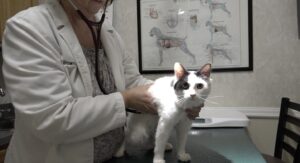
While COVID-19 mostly spreads from person to person, it can also spread from people to animals.
According to the Centers for Disease Control and Prevention, a few pets — dogs and cats — have caught COVID-19 from their owners. This happened mostly after the animals were in close contact with people infected with COVID-19.
Worldwide, there is a small number of pets that have been infected; however more cats are prone to catch the virus.
Dr. Sandra Brown, veterinarian at Northwood Animal Hospital in Tallahassee, said that she has tested pets for COVID-19 and has had no positive cases. However, cats are more likely to be infected, she said.
“There have been documented cases, mostly in cats contacting COVID. It is usually subclinical, which means they don’t show any clinical signs,” Brown said. “Isolation is important because the cats can be infectious to other cats. Theoretically, an infected cat could give COVID-19 to a human.”
COVID-19 is a type of coronavirus, and studies show that pets are more prone to coronavirus illnesses. Some particular viruses only infect animals and not humans.
“We have known about the coronavirus in pets for many years,” Brown added. “There is a form of coronavirus in cats that is specific to cats that people don’t get called FIP, which is quite deadly in cats. So, we have had a lot of studies in veterinary medicine.”
Camden Beverly, a local dog owner, said her dog had flu-like symptoms and proceeded with precautionary measures to ensure safety for people and her pets.
“Now we keep our dogs separated, they are only allowed to be together when my roommate and I are home,” Beverly said. “The fear of our pets catching COVID-19 is extremely scary because they are innocent and they aren’t capable of helping themselves.”
The testing process for pets with a possible COVID-19 diagnosis involves taking nasal swabs and the throat area. The test is submitted to an outside lab for analysis of DNA of the coronavirus.
Based on the limited available information, the risk of animals spreading the COVID-19 virus to people is considered low. Animals don’t appear to play a significant role in spreading the virus that causes COVID-19. There is no evidence that viruses can spread to people or other animals from a pet’s skin, fur or hair.
According to the Northwood Animal Hospital, if your pet is infected with COVID-19, they should be isolated from people and other animals. In addition to isolation, their food and leashes should be handled with gloves and sanitation to avoid further infections.